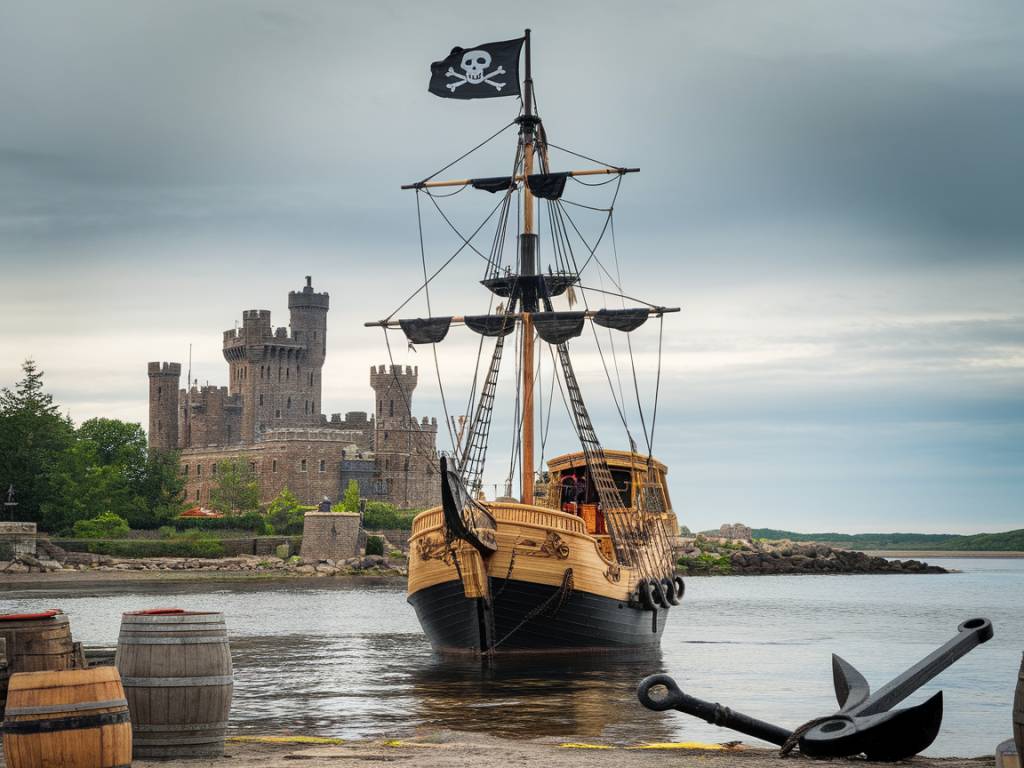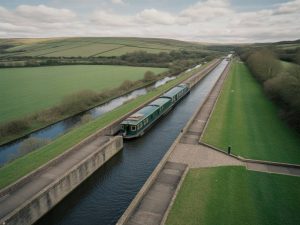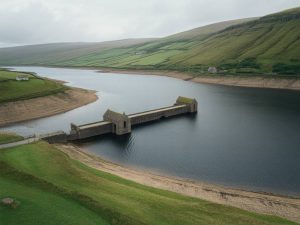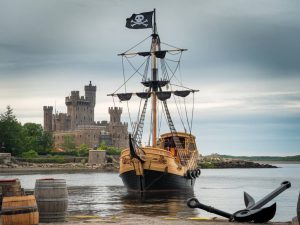The golden age of piracy and its effect on Welsh shores

The cultural importance of the Red Dragon symbol
The Golden Age of Piracy: A Welsh Perspective
When we think of pirates, the mind often conjures images of the Caribbean—crashing waves, Jolly Roger flags, and treasure chests buried on desolate islands. But did you know that Welsh shores and characters played a significant role in the infamous Golden Age of Piracy (1650-1730)? From notorious Welsh-born buccaneers to coastal towns entangled in the shadowy pirate economy, Wales holds a fascinating, yet often overlooked, chapter in piracy’s tumultuous history.
Pirates with Welsh Roots
It may come as a surprise to many, but some of the most infamous pirates of the Golden Age came from Welsh soil. Take, for example, Howell Davis, born in Milford Haven, Pembrokeshire. Davis was a cunning pirate captain whose charm and wit earned him a reputation as a master of deception. Operating across the Atlantic and the Caribbean, Davis often infiltrated enemy ships by pretending to hold official naval authority before turning his crew loose on unsuspecting victims. His exploits inspired characters in pirate folklore and tales.
Then there’s Bartholomew Roberts, or « Black Bart, » arguably the most successful pirate of all time in terms of ships captured—a staggering 400-plus during his career. Born in Casnewydd-Bach (Little Newcastle), Pembrokeshire, Roberts was a reluctant pirate at first. He only turned to the trade after being forced into service by Howell Davis’s crew. However, once he embraced pirating, Roberts epitomized the bold and brazen pirate life, sporting scarlet waistcoats and orchestrating daring attacks on heavily armed ships.
Why Wales? The Geography of Piracy
Wales’s rugged coastline made it a haven for smugglers and pirates alike. With its jagged cliffs, hidden coves, and isolated harbours, the Welsh shore was a perfect base for covert operations and a refuge from the prying eyes of naval authorities. Ports like Fishguard and Swansea were known to be hubs for trading illicit goods, while secluded beaches offered safe landing spots for contraband to be stashed away.
Even more intriguing is the role of the Bristol Channel. Stretching between South Wales and the West Country of England, this busy waterway provided countless targets for pirates. Merchant ships brimming with goods from the Americas and elsewhere faced constant threats from opportunistic raiders lurking in the shadows. The proximity to lucrative trade routes further solidified Wales’s position in the wider web of piracy during the Golden Age.
A Coastal Economy Shaped by Smuggling
During piracy’s heyday, coastal communities in Wales weren’t merely innocent bystanders. Smuggling was rife, and many towns struck a delicate balance between legality and survival. Sailors brought more than exotic tales from distant seas; they carried stolen treasure, spices, rum, and tobacco, which fueled underground economies in otherwise struggling villages.
For some communities, collaboration with pirates wasn’t just a choice—it was a means of survival. A quiet nod from the local blacksmith who repaired a pirate ship’s rudder, or a farmer who helped hide stolen goods in haystacks, could spell the difference between thriving or struggling through lean times. Such practices weren’t confined to the Caribbean; they were alive and well on Welsh soil too.
Myths and Legends from Welsh Shores
Wales’s pirate connections don’t end with historical figures and economics—they extend into myths and folktales passed down through generations. Some locals whisper of ghostly ships that still haunt the Welsh coastline, captained by buccaneers who met untimely deaths at sea. Others tell tales of buried pirate treasures hidden along secret coves, waiting to be discovered by an adventurous soul with a map marked by an « X » (or so the story goes).
One particularly chilling tale talks of Skokholm Island, near Pembrokeshire, where wreckers—people who intentionally caused ships to crash on rocky shores—are said to have collaborated with pirates to loot the wrecked vessels. Such stories, though steeped in legend, hint at the morally grey relationships coastal communities had with piracy and smuggling.
The Decline of Piracy and Welsh Waters
By the early 18th century, the Golden Age of Piracy began to wane, and Welsh shores were no exception. Nations ramped up naval patrols, and laws became harsher. Many pirate crews were caught and executed publicly to deter piracy, often in ports like Bristol, where Welsh pirates sometimes faced the gallows.
The economy of Wales also began to shift during this time, with industrialisation growing in prominence. As coal mining and ironworks expanded, the allure of piracy diminished, and the romanticised yet dangerous lifestyle gave way to new economic opportunities.
A Lasting Heritage
Though the Golden Age of Piracy is long gone, its legacy lingers on in Welsh culture and heritage. Visitors to Pembrokeshire can still see reminders of the pirate past, from the ruins of old smuggler’s hideouts to museums detailing the daring (and sometimes nefarious) adventures of Welsh pirates. Events like pirate reenactments and historical festivals—many of which are family-friendly—pay homage to this dramatic chapter of history.
So, the next time you hear a story about pirates, remember that it’s not just tropical islands and distant seas in the narrative. The shores of Wales have witnessed their fair share of audacious schemes, legendary figures, and tales that continue to capture the imagination. Who knows? Perhaps that secluded Welsh cove you stumble across on a summer’s day was once a pirate’s hidden sanctuary.





